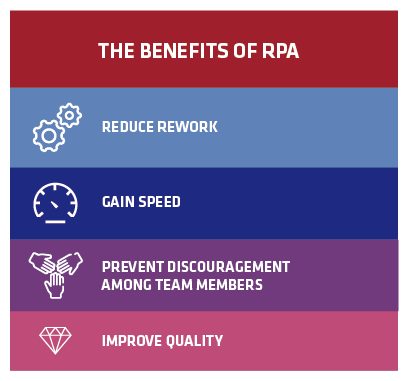Exploring the benefits of a fast and flexible solution
The quest to boost productivity in activities with several manual processes, paired with high labour costs, has led companies to seek out process automation alternatives. RPA (Robotic Process Automation) has become more popular as an option for reducing rework, improving process quality, cutting the time spent on manual activities, and preventing discouragement among members of the team.


RPA solutions are implemented to automate transaction process activities related to the collection, interpretation, and processing of data that exists in digital systems, used in daily business transactions. The creation of robots is a worldwide trend, primarily due to three benefits related to other process automation methods: streamlined implementation, cost reduction, and improved service.
Gaining Speed Through RPA
What is a Robot?
Robots are a type of software (macros, scripts, etc.) that reproduce human interaction with systems and tools. The robot can be used to automatically extract information from different sources (websites, the company’s internal system, e-mails, and excel spreadsheets, among others), process this information and record it in another system / tool. Robots are highly recommended for repetitive activities that use structured data and are based on well-defined rules.
Creating robots is faster than developing a customised system because it consists of an exact reproduction of the steps that would be taken by a person. Creating integration layers between systems is often complex or unfeasible, while extracting data from one system to import it into another is considered a basic function for a robot. In certain RPA tools, it is possible to develop a robot by dragging and configuring the actions, such as “click a button” or “type a text” or by using a step recording resource that greatly accelerates the construction of the action.
RPA as a Cost-Cutting Tool
Most of the gain in costs obtained by automating processes is related to a reduction in people. However, RPA also works to reduce costs caused by operational inefficiency, such as the reduction of fines due to delayed payments, reduced fraud, and fewer penalties from regulatory agencies.
Quality and Compliance – RPA Guarantees Improved Service Levels
Robots work 24 hours per day, seven days per week. They are much faster at completing repetitive tasks than people, and it is possible to activate robots simultaneously (based on the capacity of the corporation’s systems). This allows the company to offer a much higher service level to its clients. At the same time, RPA assists with organisations’ control and compliance, considering that the automated processes are fully standardised and comply with the established norms. Besides this, they leave detailed “tracks” of how the tasks were performed, simplifying possible audits.
About the authors
Izaías Miguel is Managing Director at Visagio and has worked as a developer, consultant, and project manager with the company for major clients in Brazil and abroad.


